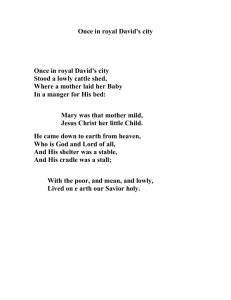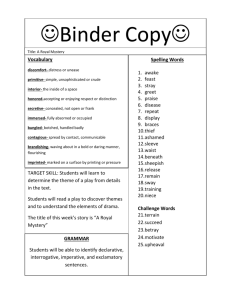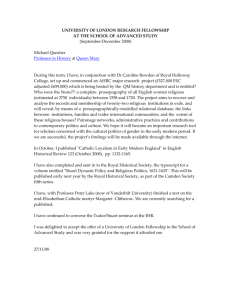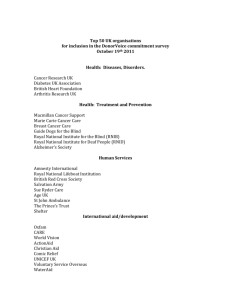Ethos, Core Values and Standards
advertisement
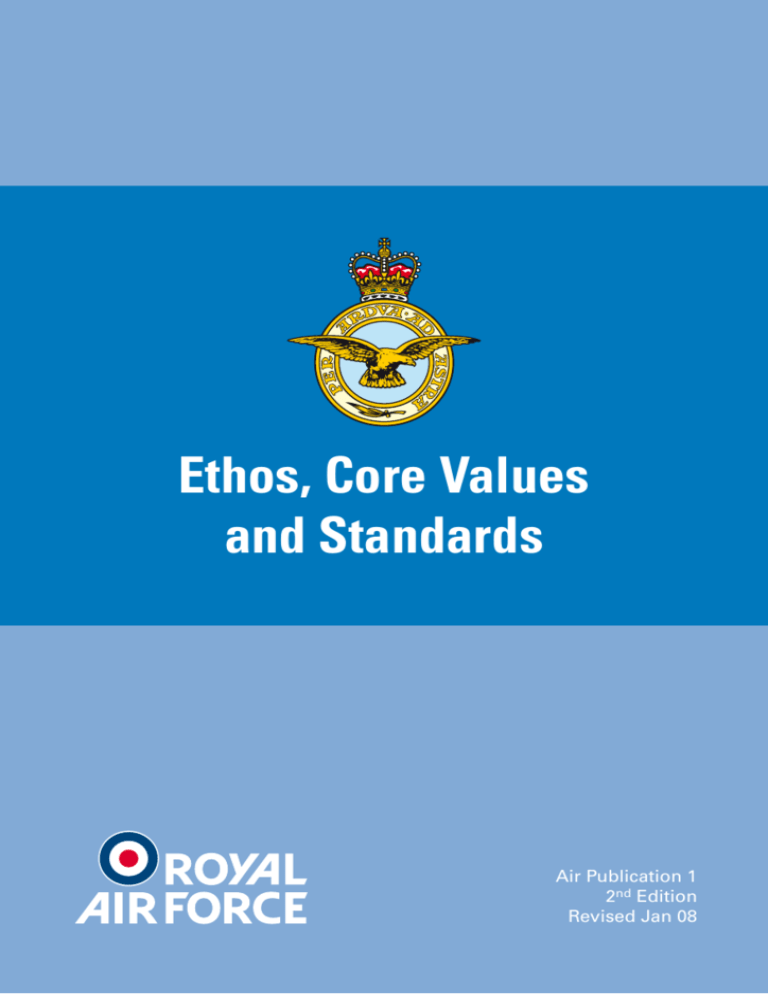
Ethos, Core Values and Standards Air Publication 1 2nd Edition Revised Jan 08 ROYAL AIR FORCE ETHOS ‘Our distinctive character, spirit and attitude that is necessary to pull together as a team, in order to deliver air power no matter the challenges or environment. We place unit and Royal Air Force success above self and strive to be courageous in the face of adversity and risk. Sustained by strong leadership, high professional and personal standards, we are bound by a strong sense of tradition and belonging to an organization of which we are immensely proud.’ ROYAL AIR FORCE CORE VALUES l Respect: Mutual and Self Respect l Integrity: Moral Courage - Honesty - Responsibility - Justice l Service: Physical Courage - Loyalty - Commitment - Teamwork l Excellence: Personal Excellence - Discipline - Pride Message by Chief of the Air Staff To all Royal Air Force Personnel ‘An agile, adaptable and capable Air Force that, person for person, is second to none, and that makes a decisive air power contribution in support of the UK Defence Mission.’ 1 As the Chief of the Air Staff, I have the privilege and responsibility of leading the Royal Air Force, which has a proud tradition and a reputation for excellence that is second to none. Our reputation is built on a foundation of consistent operational success, which has been achieved through the endeavours of Royal Air Force personnel producing outstanding results, often under demanding and dangerous circumstances. Whilst capable aircraft, weapons and sensors are fundamental to the success of air operations, it is you, as an individual and as part of a team, who ultimately makes the difference. It is only through your endeavour that our vision of a truly agile, adaptable and capable Air Force can be delivered. Our role of providing Air Power to meet the United Kingdom’s defence requirements is often performed in difficult and hazardous circumstances. Many of you will have experienced this at first hand, and those of you undergoing training will soon be contributing to operations; ultimately, this might require you to put your life on the line for our Nation. In such circumstances, success can be achieved only by motivated, capable and self-disciplined individuals. Regardless of our backgrounds, we all share the same characteristic spirit, ethos and values, and abide by the same high standards of behaviour. This is the essence of what it means to be an effective and valued member of the Royal Air Force. This publication sets out the values by which everyone in the Royal Air Force is expected to live. It also identifies the high moral and professional standards we all expect of each other. These values and standards underpin our ethos and form the foundation of mutual trust and teamwork on which our Service depends. In return for these exceptional demands, I am committed to providing you with the best possible terms and conditions of service and to meet your professional needs and personal aspirations. Please read this publication carefully. If in doubt, always remember that your values and behaviour affect not only you as an individual but also your colleagues and the way our Service is viewed by others. 1 Royal Air Force Strategy 2006 THE ETHOS AND CORE VALUES OF THE ROYAL AIR FORCE Introduction The Armed Services exist to defend the United Kingdom and its interests and to strengthen international peace and stability. The use of force in military operations is what sets military personnel apart from all other professionals. The consequences of succeeding or failing are profound. The difficulties, risks and demands on our people make our task unique. As members of the Royal Air Force, we can all be called upon to make personal sacrifices in service of the Nation as represented by the Crown. Our commitment is total, and our core values and standards are applicable on and off duty. In return, we can expect the Government and the Nation to value and recognise Royal Air Force personnel for our unique commitment in support of the UK’s values, standards and interests. The outstanding reputation of the Royal Air Force has been built on our high professional and personal standards and our ability to do our job in an agile, adaptable and capable manner. By the very nature of air power, we are likely to be in the first wave of any British military operation and we are also often required to sustain our operations in difficult and hostile circumstances for long periods. Uniquely, we are deployed on operations as part of Expeditionary Air Wings and Groups (EAW/EAG); these unique air power fighting units require us to work together no matter the background, trade or peacetime squadrons/wings from which the people are drawn. In addition to these RAF specific fighting units we are routinely involved in joint missions with our sister Services and with other nations on multinational operations. To meet the many challenges that we face, we have to work closely together and have confidence and trust in each other. Ultimately, our success and our lives might depend on our comrades. The Royal Air Force needs people who will respond to a demanding way of life, who aspire to excellence, who share a sense of duty and commitment and who understand and live by our collective values. We want men and women who are proud to serve their country and whose personal qualities reflect the core values of the Royal Air Force. The success of the Royal Air Force in any military endeavour is dependent in part upon the courage of its personnel to fight and to support the fight. Thus, the moral component of air power depends upon effective leadership, resilience, a shared set of core values, high personal standards and the total commitment that arises from a strong and binding Royal Air Force ethos. WHY DO WE NEED TO DEFINE AND EXPLAIN OUR ETHOS AND CORE VALUES ? Within the society from which the Royal Air Force recruits, there are differing attitudes towards the notion of duty, adherence to those in authority and the awareness of individual rights. Traditional shared values are not always effectively transmitted, nor are concepts such as honour and loyalty always clearly understood. Preparing and mounting air operations are activities that require high levels of discipline, putting team needs ahead of our own, with the ultimate aim of succeeding in the endeavour. It is this requirement that leads the Royal Air Force to place a particular emphasis of our own, on the values that are laid down in this publication. The nature of military operations makes great demands on individuals and teams, and it is important that these values are upheld both on and off duty. We must be able to understand and explain why these values, sometimes, need to be more demanding of Royal Air Force personnel than of ordinary citizens and why such demands apply in our day to day activities. What is Ethos ? Ethos is the characteristic spirit of a culture or community. What is Royal Air Force Ethos ? Royal Air Force ethos is: ‘Our distinctive character, spirit and attitude that is necessary to pull together as a team, in order to deliver air power no matter the challenges or environment. We place unit and Royal Air Force success above self and strive to be courageous in the face of adversity and risk. Sustained by strong leadership, high professional and personal standards, we are bound by a strong sense of tradition and belonging to an organization of which we are immensely proud.’ RESPECT, INTEGRITY, SERVICE AND EXCELLENCE What are the Core Values of the Royal Air Force ? Core values are those values by which we lead our lives and which we aspire to develop in others. The Royal Air Force core values are: Respect, Integrity, Service and Excellence, nurtured by effective and consistent leadership. These values, rooted in the moral and social development of our society over many generations, have a unifying function within the Royal Air Force and constitute the founding principles of our ethos as a warfighting Service. We have a tradition of overcoming adversity to deliver, through Air Power, exceptional results. Good leadership is crucial to maintaining ethos. It inspires and underpins the values and capabilities of the Royal Air Force. History shows that good leadership at all levels can transform seemingly unwinnable situations into success. Every member of the Royal Air Force has the duty and ability to lead and the moral responsibility to live by our core values. RESPECT. Service in the Royal Air Force is more than just loyalty to the Crown, military superiors, subordinates and comrades. It also involves the respect for others and a sense of pride. It flows from the duty to put others first and it means there is no place for prejudice or unlawful discrimination: Self-Respect. Self-respect means to have a proper sense of your own dignity and integrity. To have self-respect is to value yourself as a professional and as a human being, and underpins our attitudes to sexual behaviour, drugs and alcohol. People with self-respect have high personal standards of social behaviour and do not behave in ways that bring discredit upon themselves, their comrades, their unit or the Royal Air Force. Mutual Respect. Respect for others permeates up and down the chain of command as well as among peers. Genuine respect involves viewing other people as individuals of genuine worth, regardless of their race, ethnic origin, religion, gender, sexual orientation or social background. Sometimes, respect for people is required by law. For example, in relation to an armed conflict, the Geneva Conventions require that we respect the dead, the wounded, civilians, prisoners of war and refugees. Service personnel must follow the law and maintain the highest of standards of decency and justice toward people at all times, even in the most difficult conditions. The need for decency, compassion and respect for others is increased by the conditions in which personnel may have to live and operate, particularly on operations. INTEGRITY. Integrity is the courage to do what is right in all circumstances. It is the basis for the trust that is essential for the Royal Air Force to operate effectively. Integrity is vital in establishing trust and confidence between individuals who may face hardship and danger. Integrity is based on several other moral principles: Moral Courage. Moral courage is the conviction to do what you believe to be right, even though it might be unpopular or dangerous and the personal cost might be high. Courage to refuse to compromise personal values in the face of opposition, and to sustain the highest standards of decency and behaviour, will earn the respect of others and will build trust. Courage, both physical and moral, forms the bedrock upon which bravery, fighting spirit and success depend. Honesty. Honesty is a way of life in the Royal Air Force because, as members of a professional armed service, our word must never be in doubt. Deceit, dishonesty or breaches of trust or confidence show a lack of integrity, and call into question an individual’s reliability. Examples are committing a criminal offence or behaving in a way that raises doubts about an individual’s character. If an individual is found to be dishonest or disloyal, trust between comrades will be damaged and the tension created within a team will reduce its effectiveness. Responsibility. Truly responsible people acknowledge their duty and act accordingly. Responsibility demands that all people in positions of authority are fair and consistent at all times. Only then will they earn the respect and loyalty that are essential to good leadership. Responsibility is all-pervasive and is not something that individuals can pick and choose in part. Justice. A person of integrity practices just behaviour and treatment. It is vital in the Royal Air Force that there is fairness of treatment for all and that justice is done and is seen to be done without favour. SERVICE. Service is an act of selfless commitment. The military life is one of service to the Nation. It is about professional duties taking precedence over personal interests, the willingness to serve other people before ourselves ‘Service before self ’. Service incorporates the values of loyalty, commitment and teamwork. It might ultimately be about dying for others. Service takes considerable physical courage. Physical Courage. We must be prepared to help deliver air power. In doing so, we will be involved in tasks that either directly involve or contribute to the use of deadly force. We might be required to directly take the lives of others or knowingly risk our own, or to witness the injury and death of our comrades but still continue with the task in hand. This requires physical courage and the support of our colleagues. Loyalty. As Royal Air Force personnel, our first loyalty is always to the Crown. From the moment we are attested or commissioned, we are each committed to an unswerving loyalty to defend, uphold and preserve the Crown. Colleagues must show professional and social loyalty to each other. Those who are placed in positions of authority must be loyal to their subordinates, representing their interests faithfully and dealing with complaints thoroughly and fairly. Subordinates must be loyal to their leaders, the RAF, their team and do their duty. Such loyalty is expected, but it must also be earned through commitment, self-sacrifice, example and courage. Commitment. Commitment works in 2 ways. For individuals, it means a wholehearted dedication to serve wherever and whenever required, whatever the discomfort or dangers, and to do their best at all times. This commitment is reflected in the wording of the loyal oath taken on attestation or commissioning, when we agree to put our interests below those of the unit, Royal Air Force and Nation, as represented by the Crown. Commitment limits our individual freedom and requires a degree of self-sacrifice. For those in command or leadership positions, it requires that we always meet in full our responsibilities to subordinates. We share common bonds of identity, loyalty and responsibility for each other. We accept that the needs of the Service are put before our own. In return, the Royal Air Force has a commitment of duty of care to its people and for the welfare of their families. At the highest level of command, members of the Air Force Board are committed to: ensuring that we are properly prepared for operations; ensuring that the Royal Air Force has sufficient trained people to meet its commitments; working to provide sufficient/decent standard of accommodation, high standards of health and welfare care and effective terms and conditions of service; and managing people’s careers and professional/personal development fairly whilst balancing the needs of the Service with individuals’ aspirations. Teamwork. Teamwork is essential in every area of our activity. Teamwork means working in harmony with every member of our Service, with the other Services, civil servants and contractors. Equally, we need to be able to work with the citizens and armed services of other nations. EXCELLENCE. By striving for excellence we show a sustained desire for continuous improvement and innovation that will ensure the Royal Air Force remains second to none. Professional excellence is more than the trade or operational skills that we develop through training and during our Service lives. It is about the way we tackle tasks, take responsibility and ensure a job is well done, no matter how difficult the circumstances. Professional excellence requires us to exercise care in leadership and fulfil the welfare responsibilities of command. We must manage risk and understand consequence and effect. We must also have the courage to take calculated risk. Excellence also includes an obligation to ensure the most efficient and effective use of resources, including our people Personal Excellence. Every member of the Royal Air Force must strive to achieve and maintain the highest professional and personal standards, thereby enhancing both the competence and cohesion of the Service. We must make every effort to stay in good physical, mental and spiritual condition for our own health and well-being and also as a personal responsibility to those with whom we serve. Exercising regularly enables us to be fit not only for day to day activities, but also for more demanding operational duties. It is our responsibility to develop our own and others’ professional understanding of how air power is most effectively applied and how it can remain relevant and capable in contemporary environments. Discipline. The most effective discipline is self-discipline, which comes from within and is not imposed. Good discipline enables us to achieve more than we would normally expect of ourselves. Because discipline is vital to success, commanders must be able to enforce it when necessary. This requires clearly understood rules and a military legal system. For such a system to work on operations it must be in place at all times; it cannot be turned on and off at will. Discipline must, therefore, be rigorously but fairly upheld by everyone in positions of authority. Self-discipline must be embraced by all of us, both on and off duty. Pride. Pride is justifiable confidence in oneself and in the Royal Air Force, based on heritage, successes and achievements, our attitude to life and team spirit. We should be able to compare ourselves and our colleagues favourably with our sister Services and with the air forces of other nations. We must be proud of our expertise and that we are ‘second to none’ in our delivery of air power. STANDARDS Why do we Need Standards ? Teamwork, success and effective leadership in the Royal Air Force can only flourish in an environment of mutual trust and respect. We all have a responsibility to our equals, subordinates and superiors, to uphold the Service ethos and embrace our core values. Behaviour that creates division, undermines trust or Service reputation, damages team spirit and our ability to meet operational objectives. As members of the Royal Air Force we must do all we can to sustain our core values by following a code of conduct necessarily more demanding than that found in civilian life. The standards described in AP1 are aligned with the Armed Forces Code of Social Conduct. What Standards Must we Strive to Achieve ? Social Conduct. As members of the Royal Air Force we live in a close-knit organisation where individuals must rely on each other, sometimes for our lives. As a consequence, we must all exhibit the highest standards of social conduct, which will inevitably be greater than that seen in society as a whole. The Royal Air Force has no right to interfere in the private lives of its personnel unless it is necessary to do so to maintain Service discipline, team cohesion and operational effectiveness. When considering whether or not to intervene, the Royal Air Force will apply the following test: ‘Have the actions or behaviour of an individual adversely impacted, or are they likely to impact, on the efficiency or operational effectiveness of the Royal Air Force ? ’ This test lies at the heart of the Royal Air Force’s code of social conduct. The test applies to all forms of conduct, on or off duty. Equality and Diversity. The Royal Air Force equality and diversity policy is to treat all personnel fairly irrespective of race, ethnic origin, religion, gender, sexual orientation or social background. The policy goes further than merely stopping unlawful discrimination. It recognises and values individuals from diverse backgrounds, who bring fresh ideas and skills. All of us have a right to live and work free from harassment, intimidation and unlawful discrimination, and have equal opportunities and encouragement to realise our full potential. Abuse of authority by intimidating or victimising others, is unacceptable behaviour that undermines trust and respect. Harassment, bullying and unlawful discrimination undermine confidence, erode morale and destroy cohesion which, in turn, damages operational effectiveness. The Royal Air Force does not accept behaviour of this kind and all personnel, regardless of rank, have a responsibility to set the right environment and to challenge inappropriate behaviour. In this, it is critical to be aware that it is how such behaviour is received or perceived, and not how it was meant, that matters. Similarly, initiation ceremonies that injure, humiliate, embarrass or offend those involved, or could damage the reputation of the Service are not permitted. Personal Behaviour. It is imperative to sustain team cohesion and to maintain trust and loyalty between commanders and subordinates. The standards of personal behaviour needed to meet these demands are greater than those required by society at large and must be maintained at all times. There are many examples of behaviour which can undermine such trust and cohesion, and therefore damage the morale or discipline of a unit (and hence its operational effectiveness) they include: l unwelcome sexual attention in the form of physical or verbal conduct; l over-familiarity with the spouses, civil partners or partners of other Service personnel; l displays of affection which might cause offence to others; l behaviour which damages or puts at risk the marriage, civil partnership or personal relationships of Service personnel or civilian colleagues within the wider Defence community; l taking sexual advantage of subordinates; l probing into a person’s private life and relationships They include unwelcome sexual attention or over-familiar behaviour; displays of affection that cause offence to others; behaviour that damages the marriage or personal relationships of Service personnel or civilian colleagues; and taking sexual advantage of subordinates. Each case is judged individually. The Royal Air Force also sees abuse of position, trust or rank, or taking advantage of an individual’s separation, as particularly serious conduct. Drugs. Drugs and solvents impair judgement and reliability, reduce fitness, damage health and degrade performance. People who misuse drugs are a liability to themselves and their team. Therefore, drug misuse is regarded as particularly serious and such behaviour is incompatible with service in the Royal Air Force. Because drug misuse poses a significant threat to operational effectiveness, the Royal Air Force has a policy of random compulsory drug testing to deter such activity. People who commit drugsrelated offences will almost always be dismissed from the Service. Possession or misuse of controlled drugs is an offence under both Service and civil law. Similarly, misusing solvents or other harmful substances might be an offence under the Armed Services Act. Alcohol. The operational role of the Royal Air Force demands the highest standards of technical and administrative efficiency. We perform exacting duties which often directly affect the lives of colleagues. We are liable to be called for duty at any time. Therefore, excessive consumption of alcohol and, sometimes, any alcoholic consumption, affects our ability to perform duties safely and effectively. Personnel under the influence of alcohol cannot be relied upon to perform their duties competently, placing their own lives, and those of their colleagues, at risk. For these reasons, the Royal Air Force expects us to be sensible in our drinking habits. For those with a serious drinking problem, help is available for those genuinely willing to reform, including rehabilitation with appropriate medical and welfare support. Clearly, people who cannot or will not reform bad drinking habits, that prevent them from performing their duties to the standards required, are unsuitable for employment in the Royal Air Force. Financial Management. All of us in the Royal Air Force are expected to manage our finances responsibly. Such matters are usually regarded as private and personal. However, where the Royal Air Force becomes directly involved, for example through Service funds or by a legitimate complaint, then administrative or disciplinary action might be taken. Unmanageable or irresponsible indebtedness displays a lack of judgement and self-discipline. It may also create an administrative burden, or could lead to an individual becoming a security risk and might impact on a person’s future employment in the Royal Air Force. Contact with the Media and speaking in Public. The Royal Air Force is held in high regard by the British public and has an enviable reputation worldwide. We should all take pride in this hard earned reputation and it is incumbent on us all to help others understand what we do, how we do it and the success we achieve. Success, however, will depend on everyone in the Royal Air Force playing their part. By engaging with the media, and also speaking at public gatherings such as conferences, we can help tell the Royal Air Force’s story. Whilst such engagement is encouraged, our responsibility to the Crown, through Parliament, means that we must be, and be seen to be, apolitical. Moreover, we must ensure that the impact of disclosure of information - either accidentally or deliberately - does not breach the law, such as the Official Secrets Act, compromise Operational Security or bring the Royal Air Force into disrepute. In the 21st century media-rich environment, personnel need to be aware that contact with the media and communicating in public is not just through traditional channels but also through the internet via bulletin boards and blogs and via mobile phones. Given the plethora of means by which to communicate, anyone who wishes to talk to the media, speak in public or communicate via the internet on defence topics must seek permission to do so via their chain of command or media and communications officer. Such authorisation is not just to ensure that the contact is in the Royal Air Force’s interest but it is also designed to protect individuals who may believe that such contact will be inconsequential but may not be aware of wider media agendas. Royal Air Force Personnel and the Law Unacceptable social conduct requires prompt and positive action to prevent damage. Timely advice and informal action can often prevent a situation developing to the point where it could impair the effectiveness of a Service unit. However, if the misconduct is particularly serious, it may be appropriate to proceed directly to formal administrative or to disciplinary action. Such action is always to be proportionate to the seriousness of the misconduct. It may constitute a formal warning, official censure, the posting of one or more of the parties involved or disciplinary action. In particularly serious cases, or where an individual persists with, or has a history of acts of social misconduct, formal disciplinary or administrative action may be taken, which might lead to termination of service. As Royal Air Force personnel, we are subject to civil law and the Armed Services Act. In respect of civil law, we are no different from other citizens, and civil offences such as assault or dishonesty are incorporated into Service law. When deployed on operations, we are also subject to the laws of armed conflict and to the domestic laws applicable wherever we serve. The special requirements of the Service to maintain discipline and operational effectiveness mean there are a range of disciplinary measures and punishments that are unique to the Armed Services. This publication does not discriminate on grounds of race, ethnic origin, religion, sexual orientation or social background. Neither does it discriminate on grounds of gender, disability or age, insofar as the legislation applies to the Armed Services. This publication is sponsored by the Director Personnel & Training Strategy.

